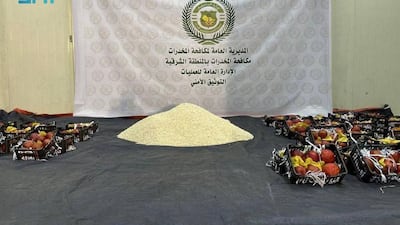Lebanon's top officials on Monday ordered security forces to step up efforts to combat smuggling.
Officials tasked the Interior Ministry with co-ordinating efforts with Saudi Arabia, as the kingdom's ban on the import of Lebanese agricultural produce went into effect.
Saudi authorities prohibited the import of fruit and vegetables originating from or transiting through Lebanon, after seizing more than five million captagon pills and more than two million amphetamine pills.
These were hidden in a shipment of pomegranates delivered to Jeddah from Lebanon.
“Lebanon is keen not to expose the safety of any country, especially Arab countries … to any danger," President Michel Aoun said.
He was speaking during a meeting with members of Hassan Diab's caretaker Cabinet and the country's top security officials.
The president's remarks were echoed by Mr Diab, who said Lebanon was keen to co-operate with Saudi authorities to dismantle smuggling networks.
Saudi officials say the latest seizure was not an isolated incident. Riyadh's ambassador to Lebanon said on Sunday that more than 600 million pills and hundreds of kilograms of hashish have been smuggled into the kingdom over the past six years.
Mr Aoun said the Saudi ban on Lebanese produce highlights the need to crack down harder on all forms of smuggling, which is accentuating Lebanon’s economic and financial crisis, amid shortages in foreign currencies.
Fruit and vegetable exports to Saudi Arabia alone are worth up to $24 million a year, Lebanon's caretaker agriculture minister Abbas Mortada said.
The Saudi move, which drew support from the UAE, Kuwait, Oman and Bahrain raised concerns of a Gulf ban on the import of Lebanese agricultural products, which would further compound Lebanon's currency crisis.
The national currency has lost 85 per cent of its value since the crisis unfolded in late 2019.
A ban would deal a significant blow to Lebanon's agricultural sector and drive the prices of Lebanese produce lower, Antoine Hoayek, head of the Lebanese Farmers Association, told The National.
Mr Howayek said Gulf markets accounted for 55 per cent of Lebanese agriculture produce, and that a ban would have long-lasting consequences for the country's farming sector.
Lebanese farmers say the pills hidden inside pomegranates seized by Saudi officials originated in Syria, not Lebanon.
Syria has witnessed a boom in the production of captagon since the country's civil war began a decade ago, with neighbouring Lebanon serving as a channel to the global market.
On Saturday, the Lebanese army said it had raided a captagon manufacturing facility in Baalbek, north-east of the capital Beirut.
The area is a stronghold of the Iran-backed Lebanese militant group Hezbollah, whose forces have been fighting alongside the Syrian regime.






